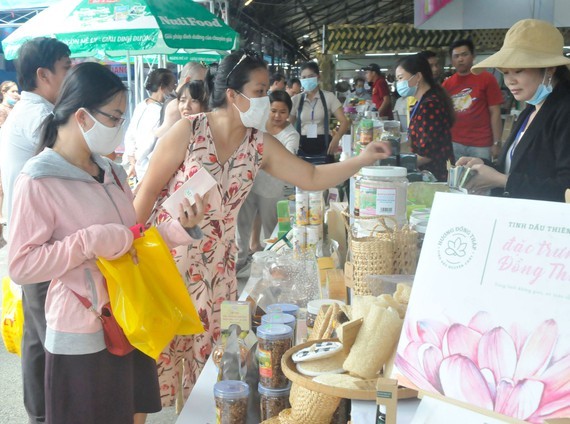
Besides the hot issues arising in the post-Covid-19 period, enterprises have been facing concerns over a sharp decrease in the shopping and consumption habits of the society.
Mr. Phan Van Dung, Deputy CEO of Vissan Joint Stock Company, worriedly said that the business situation at the company was facing difficulties due to the sharp decline in purchasing power in both fresh and processed product categories, especially in recent months. It seems that consumers are cutting down more and more the demand, including daily essentials, such as fresh foods, to increase saving money for the family budget. According to Mr. Dung, for the group of fresh pork, possibly because of the consequences of the Covid-19 pandemic, along with the high prices of pork, because the country has not been active in the supply of pork, Vissan merely slaughters around 600 pigs every night, equal to 50 percent of output compared to the same period last year, but consumption remains extremely poor. Similarly, for the group of processed foods, purchasing power only increased during the peak of the fight against Covid-19 and has steadily decreased since June.
Many other companies also shared the same point of view that the purchasing power in the market remained very weak. Observing the needs and shopping behaviors of customers at some leading supermarkets and shopping centers in Ho Chi Minh City shows that the need to visit and relieve stress is quite popular. Accordingly, the value of shopping bills also fell sharply. Ms. T.M.Hong, a cashier at a supermarket in District 2, said that the average value of a shopping bill at the same time last year was from VND1 million to VND1.5 million, but now it has halved. The group of selected items is mainly essential foods and cosmetics. On the other hand, the purchasing power only concentrates on the brands that are running promotional campaigns. This fact has urged many enterprises and retailers to continuously adjust their business strategies and revenue in 2020 to correspond to reality. Enterprises said that as long as revenue reaches the same level, or even down about 10 percent compared to last year, it would be a success.
In traditional markets, purchasing power has declined drastically. Ms. Ngoc, owner of a cosmetics stall at Ben Thanh Market, said that unlike handicrafts and souvenirs, whose purchasing power totally depends on tourists, cosmetics are mainly sold to regular and local customers but, there is also no way to draw customers to the market. Sometimes, she has no customers for four consecutive days.
‘Although I cannot sell products, I still have to open my stall every day. Otherwise, I will lose all of my patrons,’ Ms. Ngoc said.
Currently, nearly half of the stalls in Ben Thanh Market remains closed. Many small traders had to hand back their stalls because they could not afford the cost of renting the premises. In markets like Tran Huu Trang and Nguyen Van Troi, many stalls have stayed closed since the last Lunar New Year.
Creating resilience by stimulus programs
Data from the Department of Industry and Trade of HCMC shows that, although the total retail sales of consumer goods and services are on the positive trend, reaching more than VND115.36 trillion in October this year, the total retail sales still drop by 5 percent compared to the same period of last year. In the first ten months of this year, trade and service revenue is estimated at above VND1.05 quadrillion, down 2.1 percent over the same period, while it went up 11.6 percent in the same period last year. Of which, the revenue from retail sales of goods in ten months is estimated at above VND680.6 trillion, up 9.9 percent over the same period, accounting for 64.32 percent of the total retail sales of goods and services in the city.
The fact that purchasing power has not actually prospered also significantly affected industrial production in the city. According to calculations, the monthly industrial production has increased quite significantly from May to now. The Industrial Production Index (IIP) increased by 7.9 percent in May, 13.7 percent in June, 8.6 percent in July, 4 percent in August, 9.6 percent in September, and is estimated to increase 5.8 percent over the previous month in October. However, in the first ten months of this year, the IIP fell by 4.7 percent while it surged by 7.3 percent in the same period last year. Of these, four major industries are estimated to slide by 0.14 percent while they rose by 5.7 percent in the same period in the same period.
The Investment and Trade Promotion Center of HCMC (ITPC) has also organized showcases, exhibitions, and direct connections to bring goods into distribution networks, such as Big C, Aeon Mall, and MM Mega Market, at the same time, increase export opportunities to the distribution chains of the above supermarkets. To solve capital problems, ITPC has connected enterprises with demand for loans with domestic and international financial institutions and supported Vietnamese enterprises to sell goods through e-commerce platforms, like Amazon. On November 18, ITPC will hold an annual export forum to provide necessary information on planning production and business strategies and market orientation in 2021 for enterprises.
From the perspective of enterprises, a series of promotional campaigns will be carried out to both stimulate demand and share the spending pressure with consumers. Mr. Phan Van Dung said that Vissan has never implemented so many promotions like this year. At this time, it has cooperated with distributors and partners to simultaneously carry out many programs.
The resilience of the post-Covid-19 economy will largely depend on the recovery of enterprises. Therefore, besides stimulating demand, the city’s departments need to develop specific mechanisms and policies, such as reducing taxes for small traders, organizing more programs to connect goods, and mobilizing more low-interest-rate capital, to motivate enterprises to overcome difficulties and develop sustainably.
























